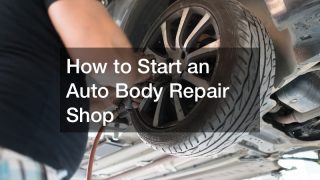
Ever wondered how you can save money on car repairs by becoming your own mechanic at home? With the right guidance and tools, you can perform a variety of car maintenance tasks without having to step into an auto repair shop. In this extensive guide, we’ll cover ten practical car maintenance skills that you can master right in your garage, from fixing your pedals to ensuring your vehicle is ready to hit the road again. Not only will these skills save you a substantial amount of money, but they will also give you the confidence to handle unexpected car troubles. Moreover, by learning car maintenance, you can keep your vehicle in optimum condition, effectively elongating its lifespan and maintaining its resale value. We will delve into diverse aspects like changing tires, tool rental, diesel fuel delivery, and even how to earn cash for used cars. Whether you’re dealing with scratches, dents, or bumper repairs, this guide has got you covered. Furthermore, we’ll touch upon the aftermarket car part market and how it can be a game-changer for budget-conscious car owners. By the end of this article, you’ll have the knowledge and the skills to take on multiple car repair tasks effectively, transforming you into a competent mechanic.
1. Learn to Fix Your Pedals
One of the first skills to master as a mechanic is learning how to fix your pedals. Pedal issues can disrupt your driving experience, making this an essential skill. The pedals, especially the brake pedal, play a crucial role in the safety of your vehicle. When you notice any irregularities, such as squeaking or a spongy feeling, it is essential to address these issues immediately.
Begin by inspecting the pedal assembly and the brake switch. Often, the issue can be as simple as a loose bolt or a worn-out brake switch, both of which can be easily replaced at home. Make sure to keep a toolkit with the necessary wrenches and replacement parts for such tasks. Regular inspection and maintenance of the pedals will contribute significantly to the efficient working of your vehicle’s brakes and overall performance.
Additionally, lubricate the moving parts of the pedal assembly to ensure smooth operation and avoid unnecessary wear. If you encounter persistent problems, consider consulting online guides or tutorials specific to your vehicle make and model. This targeted approach will help you effectively tackle pedal issues, making your experience more efficient.
2. Change Your Own Tires

Changing tires is perhaps the most fundamental skill for any aspiring mechanic. Knowing how to replace new tires is crucial for ensuring a smooth and safe driving experience. Start by parking your vehicle on a leveling surface and use the emergency brake. Gather your tools like a jack, lug wrenches, and spare tires which you can find at any tool rental service.
Begin by loosening the lug nuts before jacking up the car. Once the vehicle is lifted, fully remove the lug nuts and take off the old tire carefully. Place the new tire onto the hub and align it with the lug nut posts. Replace the lug nuts but don’t tighten them fully until the vehicle is lowered back to the ground. This ensures the new tires are evenly aligned.
Check for the manufacturer’s recommendation on the appropriate tire pressure to maintain. Regularly changing and rotating your tires will increase their longevity and improve your driving safety. By mastering this essential skill, you’ll gain the confidence to handle tire-related issues that might arise on the road, establishing yourself further as a reliable mechanic.
3. Rent the Proper Tools
Having the right tools is indispensable when you want to succeed. While buying every tool can be expensive, tool rental services provide an excellent alternative. Before starting any repair, make an inventory of the tools you need for the task. Commonly used tools include wrenches, screwdrivers, jacks, and specialized diagnostic tools for more complex repairs.
When selecting tools, quality matters. Cheap, low-quality tools can damage your vehicle and lead to further expenses. Choose reputable brands available at tool rental services and rent them. This ensures you have the right equipment at a fraction of the price.
Having the proper tools also fosters a better understanding of auto repair tasks. As you familiarize yourself with specific tools, you’ll become more proficient in car repairs and diagnostics. Tool rental not only saves money but also allows you to experiment with different tools until you find what works best for you, making your journey as a mechanic even more rewarding.
4. Replace Your Damaged Bumper

Bumper repairs are common, whether due to minor collisions or wear and tear over time. Understanding how to replace a damaged bumper is a valuable skill for any mechanic. Start by examining the bumper to determine if it needs a simple repair or a complete replacement. Small scratches can often be buffed out, but significant dents or cracks may necessitate a full bumper replacement.
Remove the damaged bumper by loosening and taking off the screws and bolts. Be careful with the wires connected to your vehicle’s sensors and lights, ensuring they are disconnected without any damage. Once the old bumper is removed, you can attach the new one by aligning it with the mounting points and securing it with bolts and screws. Make sure everything is tightened appropriately and reattach any previously disconnected wires.
Selecting quality replacement parts is crucial for a successful repair. You can find affordable and durable options in the aftermarket car part market. Performing your bumper repairs saves money and ensures that your vehicle remains in top condition, gradually building your proficiency.
5. Repair Scratches and Dents
Scratches and dents are inevitable for any vehicle over time. Learning auto body repair can help you maintain your car’s aesthetic and value. Start by washing the affected area to remove any dirt or debris. Assess the depth of the scratch or dent to determine the best repair approach. For minor scratches, a simple polishing kit might suffice, but deeper ones may require more extensive treatment.
For dents, using a dent puller can be highly effective. These tools are available through most tool rental services and are user-friendly. Attach the dent puller to the dented area and gradually apply pressure until the dent pops out. After this, a gentle sanding and repainting can restore the original look of your vehicle.
Investing time in auto body repair not only enhances your skills but also significantly reduces the cost of cosmetic repairs. Polishing and painting are relatively simple tasks that can be mastered with practice, enabling you to handle auto body repairs independently. Working on scratches and dents ensures your vehicle always looks its best.
6. Expand Your Knowledge

Expanding your knowledge beyond basic car repair tasks can be beneficial, especially when dealing with larger vehicles like RVs. RV repair requires a unique set of skills and tools due to its size and complexity. Familiarize yourself with common RV issues, such as plumbing, electrical systems, and tire maintenance, to become a well-rounded mechanic at home.
Start by focusing on maintenance tasks like checking the RV’s fluid levels, inspecting brakes, and ensuring the electrical systems are functioning correctly. Regular upkeep prevents significant issues and keeps your RV in excellent condition for trips. Resources like RV-specific repair manuals and online forums can provide valuable insights and troubleshooting tips.
Gaining proficiency in RV repair expands your capabilities and opens up opportunities for additional income streams. RV owners often seek knowledgeable individuals for maintenance and small repair tasks, providing a source of cash for used cars and RV services. This new skill set further establishes your reputation and effectiveness as a mechanic at home.
7. Find Less Expensive Alternatives
One way to save money and ensure the longevity of your vehicle is by exploring less expensive alternatives such as aftermarket car parts. Original parts can be pricey, but many high-quality aftermarket options are available that fit a variety of budgets. When purchasing aftermarket parts, research well to ensure compatibility and reliability.
Additionally, purchasing these parts from reputable suppliers and consulting user reviews can help you make informed choices. Many aftermarket parts offer improvements over the original designs, giving you an opportunity to upgrade your vehicle affordably. This savvy approach to sourcing parts underscores the financial acumen of a dedicated mechanic at home.
Incorporating aftermarket car part replacements into your regular maintenance routine can effectively extend the life of your vehicle without breaking the bank. Through strategic purchasing and smart repairs, you can maintain your vehicle’s performance and appearance, solidifying your role as a knowledgeable and resourceful mechanic at home.
8. Fuel Your Vehicle

Keeping your vehicle fueled is a basic but critical aspect of regular maintenance. Diesel fuel delivery services can be convenient for individuals owning diesel-powered vehicles and machinery. Rather than waiting in line at local stations, have your diesel delivered to your doorstep, saving you both time and effort.
Research local diesel fuel delivery services to find the most reliable and cost-effective options. Evaluate factors such as delivery range, pricing, and customer reviews to make an informed decision. This service can be particularly beneficial for those who also manage RVs, boats, or farm machinery requiring diesel.
Regularly checking and maintaining your fuel levels is part of comprehensive vehicle upkeep. Keeping track of your fuel consumption and managing deliveries effectively can help you avoid running out unexpectedly. In this way, diesel fuel delivery becomes a practical addition to your skill set as a competent mechanic at home.
9. Make Money with Your Skills
Once you’ve honed your skills as a mechanic at home, you might consider turning these abilities into a source of income. One way to do this is by offering cash for used cars and performing repairs and refurbishments before reselling them at a profit. Start by assessing vehicles’ potential resale value and the required repairs.
Flipping cars can be profitable, especially with your acquired skills, making your repairs cost-effective. Create a checklist of common issues to inspect, such as brakes, tires, engine performance, and body condition. Addressing these can significantly increase a vehicle’s resale value. Additionally, trade your expertise within your community by offering repair services.
Advertise your services through local listings, social media, or word-of-mouth recommendations. Highlight your capability to perform various tasks, from auto body repair to complete mechanical overhauls. This entrepreneurial approach leverages your mechanic at home skills to provide a reliable income stream while serving your community.
10. Transport Your Vehicle Safely
Occasionally, you might face situations where moving your vehicle requires more than just driving it. Tow truck services become relevant in scenarios ranging from breakdowns to transporting project cars that you plan to work on at home. Understanding how these services operate allows you to make informed decisions during emergencies.
Research reliable and affordable tow truck services in your area. Having a trusted service on speed dial can provide peace of mind, knowing that help is just a call away if your vehicle becomes immobile due to a malfunction or after an accident. Also, familiarity with these services can help transport vehicles you intend to refurbish and sell, furthering your venture.
While tow truck services can handle the heavy lifting, coupling this with your robust repair skills ensures that you can take on vehicle repairs once they are transported to your home garage. Thus, understanding and utilizing tow truck services can complement your practical skills and contribute to efficiently managing your responsibilities.
In summary, becoming a mechanic at home is an enriching venture that brings numerous benefits. From learning essential skills like fixing pedals and changing tires to more advanced tasks such as bumper repairs and auto body repairs, you can handle an array of vehicle issues independently. Utilizing tool rental services and exploring aftermarket car part offerings provides economical vehicle maintenance. Additionally, expanding your expertise into areas like rv repair and leveraging diesel fuel delivery services showcases the value of your new skills. By earning cash for used cars and knowing when to employ tow truck services, you can convert your passion into a profitable endeavor. Embrace these skills and strategies to excel, turning your garage into a hub of knowledge, efficiency, and financial savings.



